Gladiator Blu-ray Movie
HomeGladiator Blu-ray Movie 
Sapphire Series | Extended and Theatrical Cut | First PressParamount Pictures | 2000 | 1 Movie, 2 Cuts | 171 min | Rated R | Sep 01, 2009
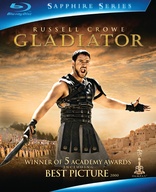
Price
Movie rating
8.6 | / 10 |
Blu-ray rating
| Users | 3.9 | |
| Reviewer | 4.0 | |
| Overall | 4.0 |
Overview
Gladiator (2000)
A former Roman General sets out to exact vengeance against the corrupt emperor who murdered his family and sent him into slavery.
Starring: Russell Crowe, Joaquin Phoenix, Connie Nielsen, Oliver Reed (I), Richard Harris (I)Director: Ridley Scott
| Action | Uncertain |
| Adventure | Uncertain |
| Epic | Uncertain |
| History | Uncertain |
| Drama | Uncertain |
Specifications
Video
Video codec: MPEG-4 AVC
Video resolution: 1080p
Aspect ratio: 2.35:1
Original aspect ratio: 2.39:1
Audio
English: DTS-HD Master Audio 5.1 (48kHz, 24-bit)
French: Dolby Digital 5.1
Spanish: Dolby Digital 5.1
Subtitles
English, English SDH, French, Spanish, Korean
Discs
50GB Blu-ray Disc
Two-disc set (2 BDs)
Packaging
Slipcover in original pressing
Playback
Region A (locked)
Review
Rating summary
| Movie | 4.0 | |
| Video | 3.0 | |
| Audio | 4.5 | |
| Extras | 4.5 | |
| Overall | 4.0 |
Gladiator Blu-ray Movie Review
Problematic picture quality hinders an otherwise great release.
Reviewed by Martin Liebman September 2, 2009Unleash hell.
It was a time unparalleled in human history. One of the great Empires of modern
civilization ruled much of the globe, and despite a landscape littered with primitive
technology and a knowledge base far less impressive than that of today, the same ideas,
emotions, deceptions, loves, and hates influenced every decision, every waking hour, every
breath, every moment of life and, ultimately, death. With such lesser knowledge and lesser
understanding came heightened dangers for those less fortunate than others; it was a place
where the well-to-do preyed on the weak and saw fit to buy and sell them not only for labor but
for
pleasure. Assembled from all corners of the Empire came the Gladiators -- often those of a
"lesser"
heritage, the poor, or even fallen heros -- men tasked with fighting to the death not for God,
country,
honor, or love, but for the enjoyment of others and the hope of seeing another day. It was a
time when sport took on a
life-and-death importance for the competitors. A time before contracts, memorabilia, product
endorsements, and statistics on the back of trading cards, these athletes were bought and sold
and fought and died unceremoniously, painfully, and with no remorse from those that would
profit from their demise either financially or emotionally through the rush of the sport and the
excitement of the kill. As witnessed in Ridley Scott's Oscar-winning epic Gladiator, it was
brutal, bloody, unforgiving -- and the stuff of legend.

The Glowing Gladiator.
In the year 180 A.D., the Roman Empire is winding down a war with the stubborn Barbarian Tribes of Germania. Leading the final assault and capping another victory for the Empire was General Maximus Decimus Meridius (Russell Crowe, State of Play). He's proven his valor in battle yet again and is hailed as the Rome's finest general. His prowess on the battlefield and his humbleness off of it has earned him the respect of Rome's Emperor, Marcus Aurelius (Richard Harris). In fact, an ailing Aurelius, who loves Maximus as a son, begs of him one final assignment before the hero returns home to live the simple life with his wife and son he so craves: to serve the Empire as the protector of Rome, rid her of the corruption that has begun even influencing his son, Commodus (Joaquin Phoenix, Signs), and prevent the Empire's inevitable decay. Maximus declines, his humble rejection sited by Aurelius as the reason why the General is exactly what the Empire needs to not only survive, but once again thrive. Commodus receives word of his father's decision to turn the Empire over to Maximus. In a jealous rage, the power-hungry Commodus murders his father and, before his father's wishes can be known, he declares himself heir to the throne and orders the execution of not only Maximus, but of his innocent wife and son. Sent to die a dishonorable death, Maximus barely escapes with his life but returns home to find his wife and son murdered. Giving up on life, Maximus collapses but later awakens as part of a slave caravan. He's sold to a former Gladiator named Proximo (Oliver Reed), and despite Maximus' initial refusal to demonstrate his skills as a fighter, his abilities become well-known once he's forced to defend himself from sharpened blades in the hands of determined foes inside the ring. Winning match after match, Maximus becomes a folk hero known as "The Spaniard," vanquishing his every foe with ease. When Commodus expresses a desire to meet the people's champion, he becomes visibly shaken as he learns the Gladiator's true identity and his ravenous thirst for revenge.
Gladiator is a good old-fashioned tale of revenge framed in a hard-hitting and grisly Action picture that took the 2001 Academy Awards by storm, ending the evening with five wins, one each for Best Costume Design, Best Visual Effects, Best Sound, Best Actor (Russell Crowe), and Best Picture of the year. Certainly a worthy nominee, Gladiator found itself at the top of the heap in a year with minimal competition; certainly there was no movie in the same class as The Godfather or No Country for Old Men for it to contend with, though Crouching Tiger, Hidden Dragon did make for a formidable and deserving-of-the-award entrant. Gladiator hearkens back to several other sword-and-sandal pictures, chief among them Stanley Kubrick's Spartacus. Of course, the two films vary widely in style. Though both epics in terms of scope and runtime, Gladiator plays out with a frenetic visual pace that's more akin to Scott's Oscar-worthy follow-up Black Hawk Down than it is the masterpieces that defined the earlier part of his career, namely the slow and deliberate but nevertheless extremely effective Alien and Blade Runner. Gladiator's frenzied style sometimes hinders the film's innate beauty and storytelling abilities, and it often feels like the strong thematic elements are in competition with, rather than expertly integrated into, the action. Nevertheless, Gladiator works on several levels, chief among them as an epic Action piece with memorable characters and several top-notch performances that overcome the visual style and solidify the emotional core.
Indeed, Gladiator's best attribute is Russell Crowe. Coming off a pair of strong performances in L.A. Confidential and The Insider (for which he earned his first of three Best Actor nominations), he shows another gear here, himself splendidly mixing action with emotion, even if the film as a whole seems to have a bit of trouble in doing so. His effort is sincere; the sense of loss is palpable, his humbleness at his accomplishments on the battlefield genuine, and his thirst for revenge driven by good intentions and a sense of honor that makes him easy to cheer for. Also delivering outstanding performances are actors Richard Harris and the late Oliver Reed, who passed away during the shoot. Harris' effort as Aurelius nearly matches Crowe's for depth and the palpable sense of honesty and goodwill that his character emotes with every line. The few scenes the two share together easily represent the best dramatic elements to be found in the picture, and there's a chemistry that's brought on by the well-scripted love for country and deeply-rooted respect for one another that the actors embrace wholeheartedly and capture effortlessly. Reed's effort, too, impresses, and his character represents perhaps the most interesting throughout the picture, providing him the opportunity to channel a broad range of emotion as he comes to be involved in Maximus' life. Also delivering solid efforts are Joaquin Phoenix, Connie Nielsen as Commodus' sister Lucilla, and Djimon Hounsou (Blood Diamond) as Maximus' fellow Gladiator, Juba. Director Ridley Scott certainly gets the most out of his actors, and while Gladiator's script isn't quite as deep, meaningful, and emotional as Braveheart's, it withstands the test of time and provides to its characters and, by extension, the actors that portray them, the opportunity to show some depth and range across a broad spectrum that proves to be the film's main attraction.
Gladiator Blu-ray Movie, Video Quality 
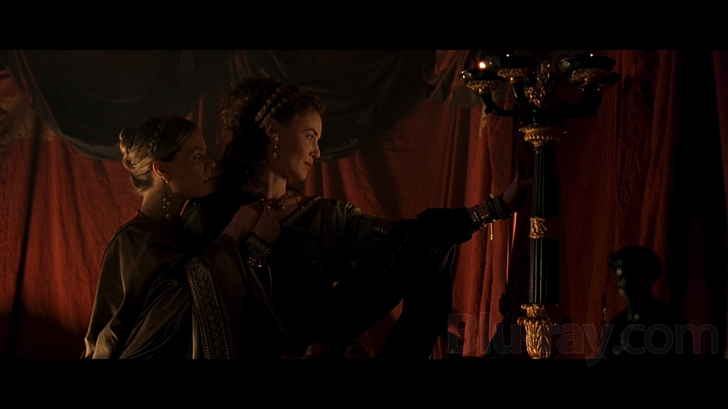
Vanishing arrows! Fireballs that phase in-and-out of the space-time continuum! No, it's not The Prestige or the
latest Star Trek; it's the
pre-release buzz surrounding Paramount's highly-anticipated Gladiator, the first of two
films, alongside Braveheart, to be
released under the brand-new "Sapphire Series" label. After weeks of speculation, back-and-forth
bickering, and plenty of rounds of "the blame game," the disc is finally on store shelves and ready
for all the world to scrutinize. Far from the worst transfer in this history of home video (beaten
out for that honor only by that worn-down VHS copy of Mitchell stashed in the garage.
Just
kidding.) but certainly
lacking in several key areas, Gladiator fails to capture the same film-like, nearly-pristine
presentation that accompanies Braveheart. As to the first point in this paragraph, the
disappearing act of 1900-year-old weapons: it's nearly impossible to notice in real-time on the
1080p presentation, viewing on a 65" screen. There are 100 other things going on in-frame
during these scenes,
each vying for viewers' attention, and it's not like Russell Crow uses the later battle scenes in
Gladiator as an
extended audition for the latest adaptation of The Invisible Man.
On to what's actually visible on the disc. Gladiator does indeed feature some scrubbing
and edge enhancement. Fine detail can look
acceptably
good throughout despite the problems, but it never looks completely natural or film-like.
Maximus' armor and fur collar as seen during the opening battle scene (home of the wayward
arrows and missing fireballs) look decent enough, but the entire scene isn't helped by the fact
that it's meant to look virtually lifeless. It takes place on the edge of a dank, dreary, cold, and
dead
forest with overcast gray skies that suck the life and color out of the entire sequence. It's not
something that's going to positively sparkle even under ideal 1080p conditions, but there is a
palpable absence of grain that further removes any sense of life from the action. The scrubbing
renders these and most other backgrounds throughout the film sterile, and while faces retain a
decent level of detail, there are patches where foreheads and cheeks look like they've been
airbrushed and are certainly not up to the same standards as the most finely-detailed Blu-ray
discs, for example The Interntaional or
Paramount's own Iron Man and Transformers.
Perhaps the most distracting element of the transfer comes in the form of extremely heavy edge
enhancement. One look at most any scene will reveal heavy outlines around characters and
objects. It's more noticeable in some places than in others, but it lends to the transfer an
artificial appearance that's wholly distracting. A good place to get an idea of how bad it can look
may be found in chapter eight during the scene that sees Maximus escape his execution in the
forest, and there are plenty of moments throughout, particularly in longer-distance shots, that
drive the point home. Flesh tones also come off as featuring a somewhat red appearance
throughout, and there's some heavy banding in the background during the film's text-based
introduction. As is the case
with every transfer on the market, different viewers with different eyes and different equipment
with different sensitivities and different expectations will inevitably see the same transfer in a
radically different light than another, and it's up to each individual viewer to judge the quality of a
disc within their own set of parameters.
Gladiator Blu-ray Movie, Audio Quality 
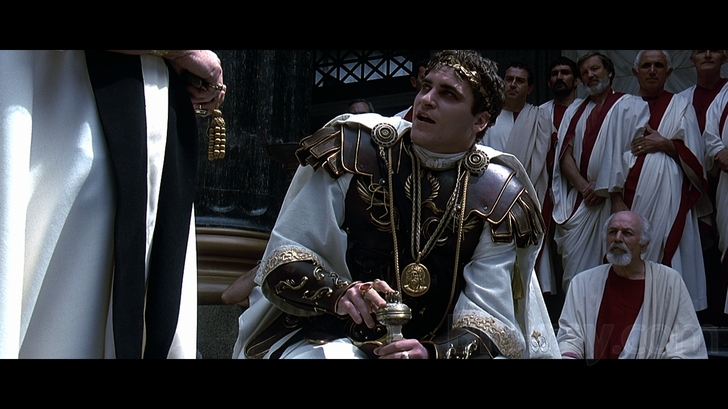
Gladiator sports a much less controversial DTS-HD MA 5.1 lossless soundtrack. Though not the most earth-shattering, record-breaking, eardrum-busting mix out there, it's well above average across the board. The opening battle sequence sets the stage nicely. Arrows -- whether visible or not -- are certainly heard with a continuous whoosh as they fly through the air towards their targets. Explosions pack a good wallop, and the general mayhem of the battle, which includes screaming soldiers and clanking swords, does well to place the listener in the midst of the carnage. Much like Braveheart, Gladiator reveals a superb nuanced presentation during the quieter segments. A brief scene taking place inside a carriage in chapter three features a fine sensation of being in the cart, with the wheels churning on a rough road outside, the carriage rattling about, and the sound of the horse galloping directly ahead. In chapter six, a breeze blows through Caesar's room and the structure seems to ever-so-slightly sway and creak as a result. As with most any action-heavy soundtrack, it's the little things during the less-intense moments that truly define the quality of the listen, and in that regard Gladiator doesn't disappoint. Still, the action segments feature a full-blown surround presence that places listeners in the arena and may even have them ducking for cover as weapons whirl and fighters maneuver in a virtually seamless 360-degree sound field that's the norm for every fight throughout. Rounded out by pitch-perfect dialogue reproduction, Gladiator sounds fantastic on Blu-ray.
Gladiator Blu-ray Movie, Special Features and Extras 
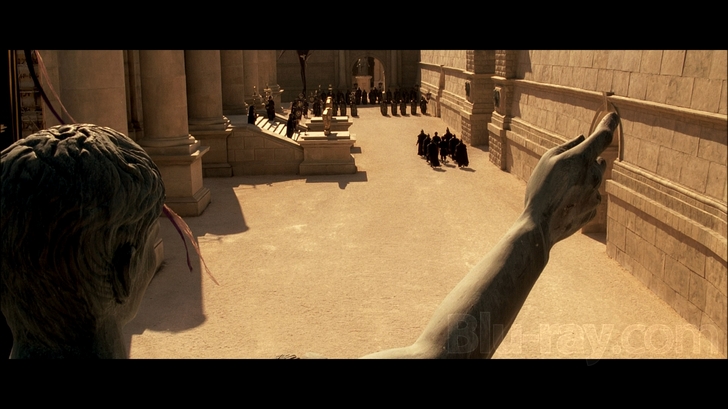
Gladiator arrives on Blu-ray as a two-disc "Sapphire Series" special edition. Disc one
sports
a pair of commentary tracks, one for each cut of the film. The extended cut track features
Director
Ridley Scott and Actor Russell Crowe in a solid and straightforward effort that begins with a
discussion revolving around the sets and shooting locations and moves on to cover the
characters and their motivations, the performances, the rigors of the shoot, shooting the action
scenes, the themes of the film, and more. The theatrical cut commentary features Scott
accompanied by Editor Pietro Scalia and Cinematographer John Mathieson. A drier and more
technical offering, each participant shares a wealth of knowledge on their particular areas of
expertise
but tie many of the observations together and in the process reveal how their work intertwines to
make a final product.
A collection of 13 deleted scenes are to be found on the theatrical cut main menu, presented in
1080p, and
most
available with optional director commentary. The Scrolls of Knowledge (available on both
cuts of the film) allows viewers to select items from a "history" scroll and leave the movie to view
the selected piece (each presented in 480p standard definition). Additional content, marked
"Visions from Elysium," are found under the "production" scroll, and may be added to a queue,
and
later
viewed upon inserting disc two.
Disc two begins with the option to view the "Visions of Elysium" material carried over from disc
one. The pieces are presented in 480p standard definition. Strength and Honor: Creating the
World of 'Gladiator' (480p, 3:16:50) is a massive seven-part documentary that covers an
extensive range of topics, including Tale of the Scribes: Story Development (34:04),
The Tools of War: Weapons (12:56), Attire of the Realm: Costume Design
(19:41), The Heat of the Battle: Production Journals (1:05:55), Shadows and Dust:
Resurrecting Proximo (24:32), The Glory of Rome: Visual Effects (20:12), and
Echoes in Eternity: Release and Impact (18:26). This documentary is also available in
an "enhanced viewing mode" that allows viewers to select additional material created exclusively
for the Gladiator Blu-ray release.
Image and Design (480p/1080p) is a five-part feature that covers an additional but more
finely-detailed
set of topics. First up is Production Design, itself divided into three segments.
Production Design Primer: Arthur Max (480p, 9:34) offers viewers the chance to learn
the basics of exactly what "Production Design" entails. Also included here are two galleries with a
host material for perusal, presented in 1080p high definition. Storyboarding is another
piece divided into three sections. Storyboard Demonstration: Sylvain Despretz (480p,
13:37) provides viewers with the opportunity to witness the construction of a storyboard.
Multi-Angle
Comparisons (480p) allows viewers to see three comparison pieces, each with multiple
angles and audio streams and optional commentary with Sylvian Despretz. The available
pieces include Germania Battlefront, Chain Fight, and The Battle of
Carthage. Next up in Image and Design is Costume Design Gallery
(1080p), a collection of stills that reveal the wardrobe design for Maximus, Commodus, Lucilla,
Proximo, Gladiators, and Marcus Aurelius, Senators, and Citizens. Photo Galleries is
simply a pair of groupings with varied subject materials. Finally, Weapons Primer: Simon
Atherton (480p, 5:03) looks at the work of creating the thousands of weapons used
throughout the production.
Abandoned Sequences & Deleted Scenes is a collection of five additional scenes, most of
which feature their own subset of options, including director commentary and featurettes.
Scenes available include Alternate Title Design, Blood Vision, Rhino
Fight, Choose Your Weapon, and Treasure Chest. The Aurelian
Archives is another massive collection of extras. Things begin with The Making of
'Gladiator' (480p, 25:03), a solid yet somewhat (at this point) superfluous piece that looks at
the production of several of the movie's major segments, complete with behind-the-scenes
footage, clips from the film, and cast and crew interview snippets. Gladiator Games: The
Roman Bloodsport (480p, 50:04) is an extended piece that features a glimpse into the world
of Gladiator fighting in ancient Rome. Hans Zimmer: Scoring 'Gladiator' (480p, 20:42)
looks at the process of complementing the movie through music. An Evening With Russell
Crowe (480p, 27:15) features the actor at an audience Q&A session. Maximus Uncut:
Between Takes with Russell Crowe (480p, 8:00) contains a collection of candid and
lighthearted moments from the set. My 'Gladiator' Journal by Spencer Treat Clark allows
viewers to peruse the young actor's written memories from his experience while making
Gladiator. Next up is VFX Explorations: Germania & Rome (480p, 23:50), a look
at the creation of the intricate special effects that bring the movie to vivid life. Rounding out this
massive collection of extras is the film's teaser (1080p, 1:15) and theatrical (1080p, 1:35)
trailers and 20 TV spots (480p, 8:55 combined runtime).
Gladiator Blu-ray Movie, Overall Score and Recommendation 
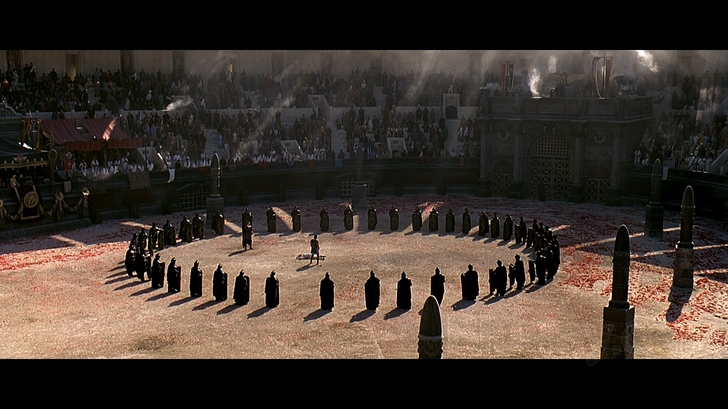
Gladiator presents a rather simply story -- one man's quest for revenge -- but adds plenty of combat, several intriguing political layers, and a romantic subtext along the way. Revenge is a tale as old as time, a staple of fiction -- and history -- that seems to bring with it an everlasting allure that, in the right hands, and with the right script, and the right backdrop, makes for some of the best movies out there. Gladiator is no exception. A Best Picture winner and a good watch on several levels, it overcomes a hyperkinetic style that sometimes distracts from the action thanks to a good story and better performances that make it a fan favorite now and, no doubt, for decades to come. Paramount's "Sapphire Series" Blu-ray release of Gladiator arrives with the expected high quality lossless soundtrack and wealth of bonus materials, but it does fall short with an overly processed video transfer that removes from the image that film-like appearance that truly sets Blu-ray apart from every other format. Still, there's one fact that seems forgotten in the midst of the venom, vitriol, confusion, and chaos. There's a movie behind the transfer, and after all, it's the movie that truly makes a disc, and no matter how capable this or any future format may be at replicating the look of film for home viewing, it means nothing if there's nothing worth watching on that pristine transfer. As to a recommendation, every Blu-ray fan owes it to themselves to see Gladiator one way or another to assess for themselves the controversy surrounding it but, more importantly, to take in and enjoy the high quality of the film thereon.
Other editions
Gladiator: Other Editions

Gladiator
Sapphire Series | Extended and Theatrical Cut | Remastered
2000

Gladiator
2 Disc Definitive Edition
2000

Gladiator
Paramount 100th Anniversary
2000

Gladiator
2000

Gladiator
2000

Gladiator
2000

Gladiator
Paramount Re-Issue
2000

Gladiator
2000

Gladiator 4K
2000

Gladiator 4K
20th Anniversary Edition
2000

Gladiator 4K
Limited Edition | Reprint
2000

Gladiator 4K
Limited Edition
2000
Similar titles
Similar titles you might also like

Kingdom of Heaven 4K
Director's Cut
2005

Troy
Director's Cut
2004

Spartacus: The Complete Series
2010-2013

Braveheart 4K
1995

Spartacus: Gods of the Arena
2011

Pompeii
2014

The Patriot
Extended Cut
2000

Centurion
2010

Band of Brothers
2001

Alexander Revisited
The Final Cut 4K | Collector's Edition
2004

300: Rise of an Empire
2014

Immortals 3D
2011

The Pacific
with Bonus Disc
2010

Robin Hood
2010

Master and Commander: The Far Side of the World 4K
2003

Red Tails
2012

King Arthur
Director's Cut
2004

The Eagle
2011

Flyboys
2006

Clash of the Titans
2010